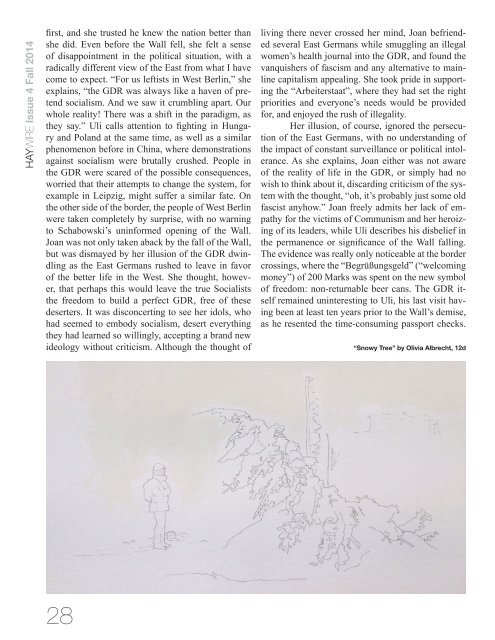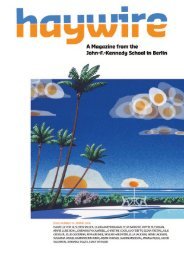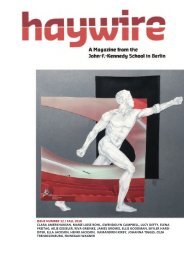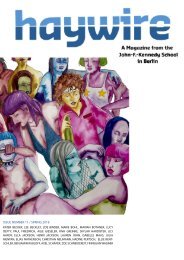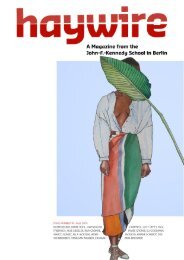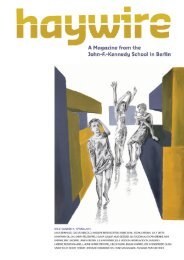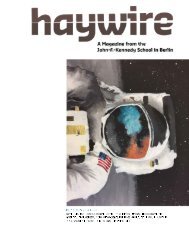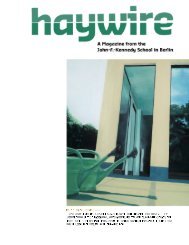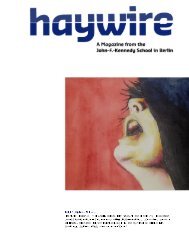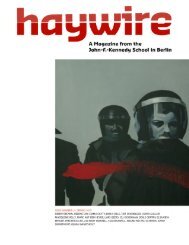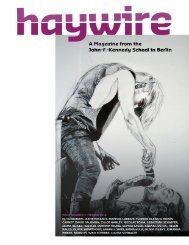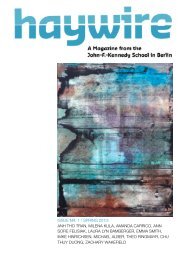Haywire Issue 4 Fall 2014
- No tags were found...
Create successful ePaper yourself
Turn your PDF publications into a flip-book with our unique Google optimized e-Paper software.
HAYWIRE <strong>Issue</strong> 4 <strong>Fall</strong> <strong>2014</strong><br />
first, and she trusted he knew the nation better than<br />
she did. Even before the Wall fell, she felt a sense<br />
of disappointment in the political situation, with a<br />
radically different view of the East from what I have<br />
come to expect. “For us leftists in West Berlin,” she<br />
explains, “the GDR was always like a haven of pretend<br />
socialism. And we saw it crumbling apart. Our<br />
whole reality! There was a shift in the paradigm, as<br />
they say.” Uli calls attention to fighting in Hungary<br />
and Poland at the same time, as well as a similar<br />
phenomenon before in China, where demonstrations<br />
against socialism were brutally crushed. People in<br />
the GDR were scared of the possible consequences,<br />
worried that their attempts to change the system, for<br />
example in Leipzig, might suffer a similar fate. On<br />
the other side of the border, the people of West Berlin<br />
were taken completely by surprise, with no warning<br />
to Schabowski’s uninformed opening of the Wall.<br />
Joan was not only taken aback by the fall of the Wall,<br />
but was dismayed by her illusion of the GDR dwindling<br />
as the East Germans rushed to leave in favor<br />
of the better life in the West. She thought, however,<br />
that perhaps this would leave the true Socialists<br />
the freedom to build a perfect GDR, free of these<br />
deserters. It was disconcerting to see her idols, who<br />
had seemed to embody socialism, desert everything<br />
they had learned so willingly, accepting a brand new<br />
ideology without criticism. Although the thought of<br />
living there never crossed her mind, Joan befriended<br />
several East Germans while smuggling an illegal<br />
women’s health journal into the GDR, and found the<br />
vanquishers of fascism and any alternative to mainline<br />
capitalism appealing. She took pride in supporting<br />
the “Arbeiterstaat”, where they had set the right<br />
priorities and everyone’s needs would be provided<br />
for, and enjoyed the rush of illegality.<br />
Her illusion, of course, ignored the persecution<br />
of the East Germans, with no understanding of<br />
the impact of constant surveillance or political intolerance.<br />
As she explains, Joan either was not aware<br />
of the reality of life in the GDR, or simply had no<br />
wish to think about it, discarding criticism of the system<br />
with the thought, “oh, it’s probably just some old<br />
fascist anyhow.” Joan freely admits her lack of empathy<br />
for the victims of Communism and her heroizing<br />
of its leaders, while Uli describes his disbelief in<br />
the permanence or significance of the Wall falling.<br />
The evidence was really only noticeable at the border<br />
crossings, where the “Begrüßungsgeld” (“welcoming<br />
money”) of 200 Marks was spent on the new symbol<br />
of freedom: non-returnable beer cans. The GDR itself<br />
remained uninteresting to Uli, his last visit having<br />
been at least ten years prior to the Wall’s demise,<br />
as he resented the time-consuming passport checks.<br />
“Snowy Tree” by Olivia Albrecht, 12d<br />
28


